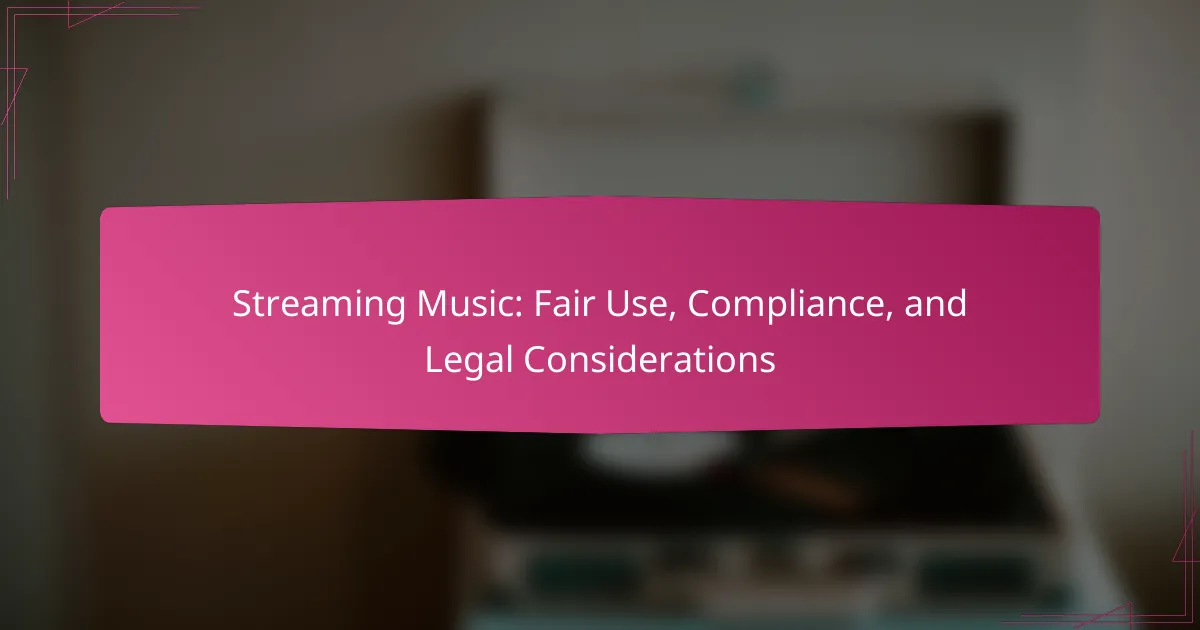Streaming music in the US requires a thorough understanding of copyright laws, licensing requirements, and compliance with the Digital Millennium Copyright Act (DMCA). Navigating these legal considerations is essential for anyone aiming to stream music legally and avoid potential legal issues. Additionally, the concept of fair use plays a role in how copyrighted material can be utilized, depending on specific factors such as purpose and market impact.
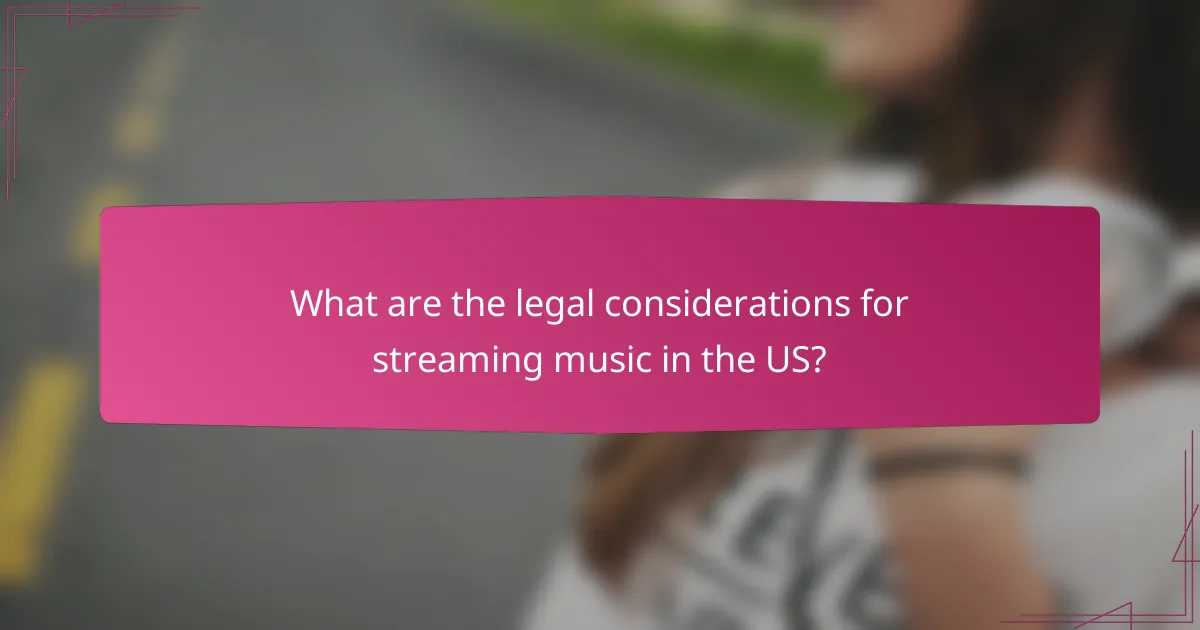
What are the legal considerations for streaming music in the US?
Streaming music in the US involves navigating various legal considerations, primarily centered around copyright laws, licensing requirements, and compliance with the Digital Millennium Copyright Act (DMCA). Understanding these aspects is crucial for anyone looking to stream music legally and avoid potential legal pitfalls.
Copyright laws
Copyright laws protect the rights of creators and owners of music, granting them exclusive rights to reproduce, distribute, and publicly perform their works. In the US, the Copyright Act of 1976 and subsequent amendments govern these rights, making it essential for streamers to respect the intellectual property of artists.
When streaming music, it is vital to ensure that you have permission to use copyrighted material. This often means obtaining licenses or using music that is in the public domain or covered by Creative Commons licenses, which allow for certain uses without direct permission.
Licensing requirements
To stream music legally, you typically need to secure licenses from performing rights organizations (PROs) such as ASCAP, BMI, or SESAC. These organizations manage the rights of songwriters and publishers, allowing you to obtain the necessary permissions to stream their music.
There are different types of licenses depending on the nature of your streaming service. For instance, a public performance license is required for live streams, while a mechanical license is needed for reproducing music. Understanding which licenses apply to your specific situation is crucial to ensure compliance.
DMCA compliance
The Digital Millennium Copyright Act (DMCA) provides a framework for copyright protection in the digital age, including provisions for streaming music. Under the DMCA, service providers can avoid liability for copyright infringement by following specific guidelines, such as promptly responding to takedown notices.
To comply with the DMCA, it is important to have a designated agent to receive notifications of claimed infringement and to implement a policy for terminating repeat infringers. This proactive approach helps safeguard your streaming service from legal issues related to copyright violations.
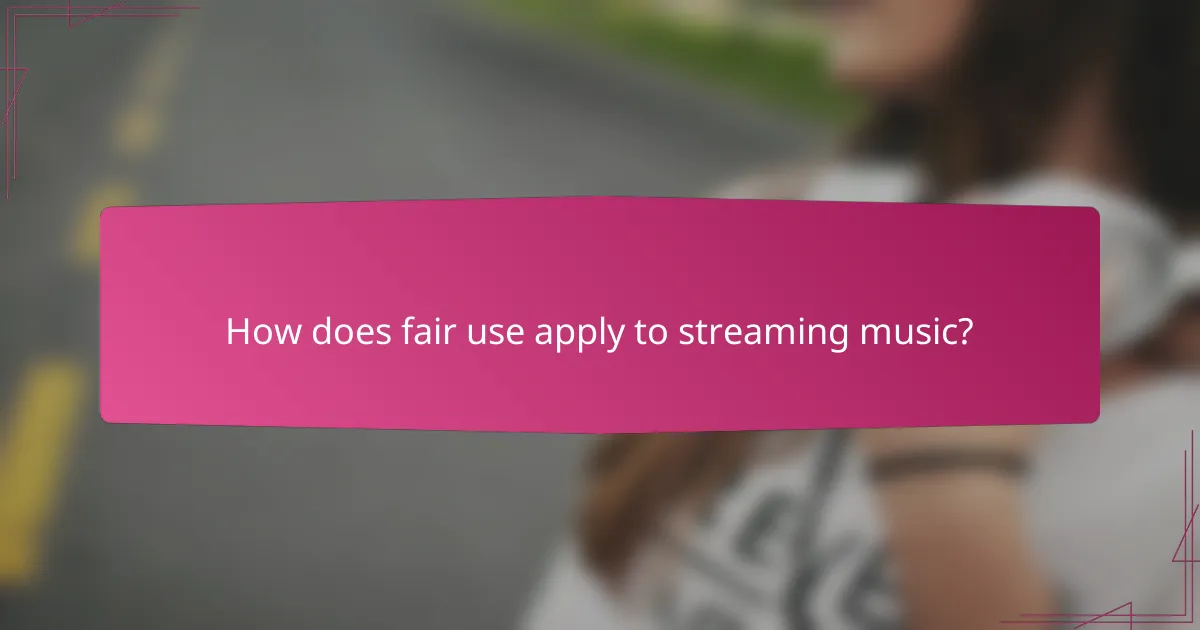
How does fair use apply to streaming music?
Fair use allows limited use of copyrighted material without permission, which can apply to streaming music under certain conditions. Key factors include the purpose of use, the nature of the work, the amount used, and the effect on the market value of the original work.
Definition of fair use
Fair use is a legal doctrine that permits the use of copyrighted material without obtaining permission from the copyright owner. It is primarily defined by U.S. law and is evaluated on a case-by-case basis, considering various factors to determine if the use is justified.
The four factors of fair use are: the purpose and character of the use (commercial vs. educational), the nature of the copyrighted work, the amount used in relation to the whole work, and the effect of the use on the market for the original work. Each factor plays a crucial role in assessing whether a specific use qualifies as fair use.
Examples of fair use in music
Examples of fair use in music include using short clips of songs for commentary, criticism, or educational purposes. For instance, a music reviewer might include a brief excerpt of a song to illustrate their analysis, which could be considered fair use.
Another example is sampling, where a small portion of a song is incorporated into a new work. While some sampling can fall under fair use, it often depends on how much of the original work is used and the context of its use. Artists should be cautious, as not all sampling qualifies as fair use.
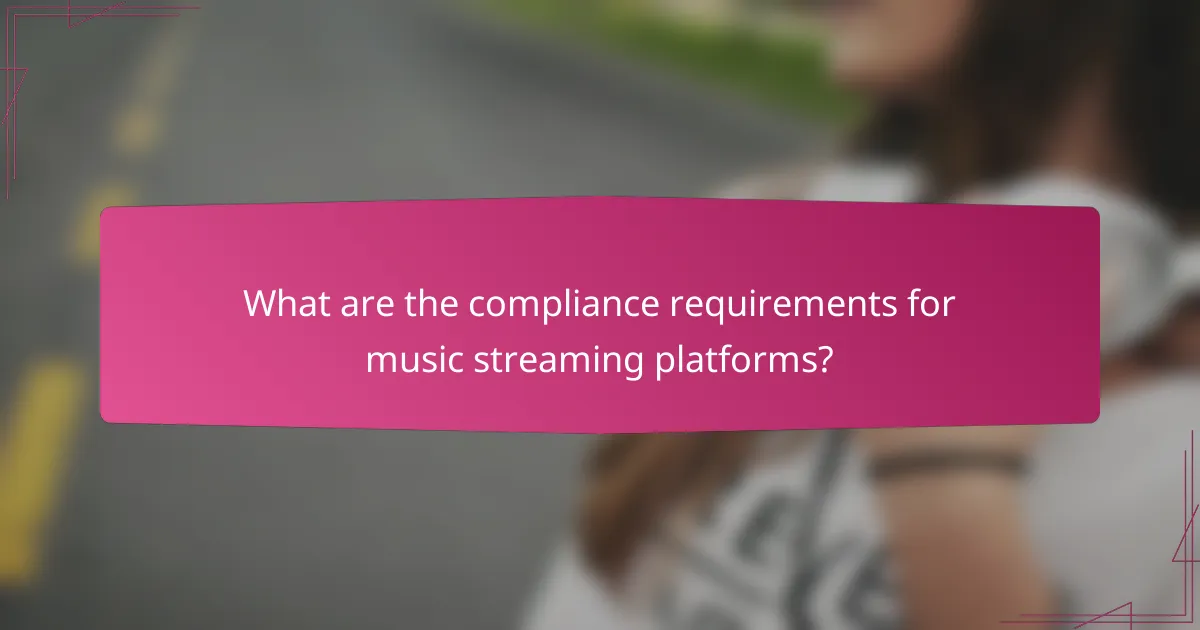
What are the compliance requirements for music streaming platforms?
Music streaming platforms must adhere to various compliance requirements, primarily focusing on licensing agreements and reporting obligations. These requirements ensure that platforms operate legally while compensating artists and rights holders fairly.
Licensing agreements
Licensing agreements are essential for music streaming platforms to legally distribute music. These contracts typically involve negotiations with record labels, music publishers, and performance rights organizations to secure the necessary rights for streaming songs.
Platforms should be aware that licensing agreements can vary significantly in terms of scope and cost. For instance, a platform may need to pay a flat fee, a per-stream rate, or a combination of both, depending on the agreement’s terms. It’s crucial to review these contracts carefully to avoid potential legal issues.
Reporting obligations
Reporting obligations require music streaming platforms to track and report usage data to rights holders accurately. This includes information on how many times a song was streamed and the revenue generated from those streams.
Platforms should implement robust tracking systems to ensure compliance with these obligations. Regular audits and transparent reporting practices can help maintain good relationships with rights holders and avoid disputes. Additionally, staying updated on local regulations regarding reporting can prevent legal complications.
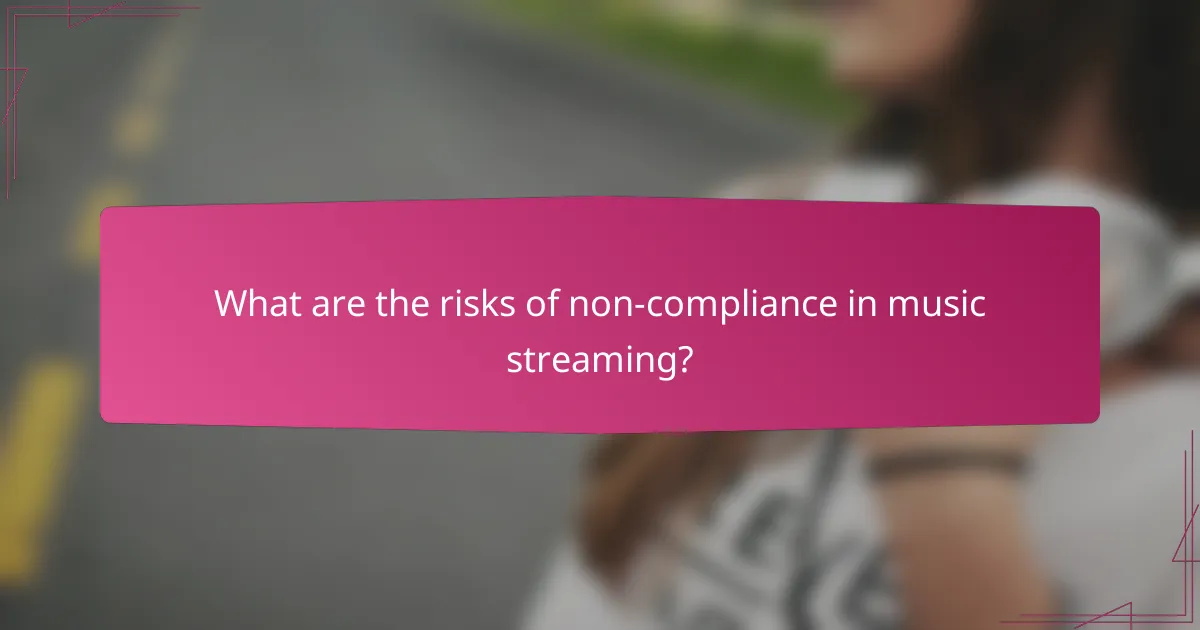
What are the risks of non-compliance in music streaming?
Non-compliance in music streaming can lead to significant legal and financial repercussions. Failing to adhere to copyright laws and licensing agreements may result in penalties, loss of revenue, and damage to your brand’s reputation.
Legal penalties
Legal penalties for non-compliance can include hefty fines and potential lawsuits from copyright holders. Depending on the severity of the infringement, fines can range from hundreds to thousands of dollars per violation, and in extreme cases, criminal charges may be pursued.
Additionally, platforms may face injunctions that prevent them from streaming certain content until compliance is achieved. This can lead to costly disruptions in service and loss of subscriber trust.
Reputational damage
Reputational damage can be one of the most lasting consequences of non-compliance. If a music streaming service is found to violate copyright laws, it may lose credibility with both users and artists, leading to a decline in user base and potential partnerships.
Furthermore, negative media coverage can tarnish a brand’s image, making it difficult to recover even after compliance is restored. Maintaining a strong reputation requires ongoing diligence in adhering to legal standards and transparent communication with stakeholders.
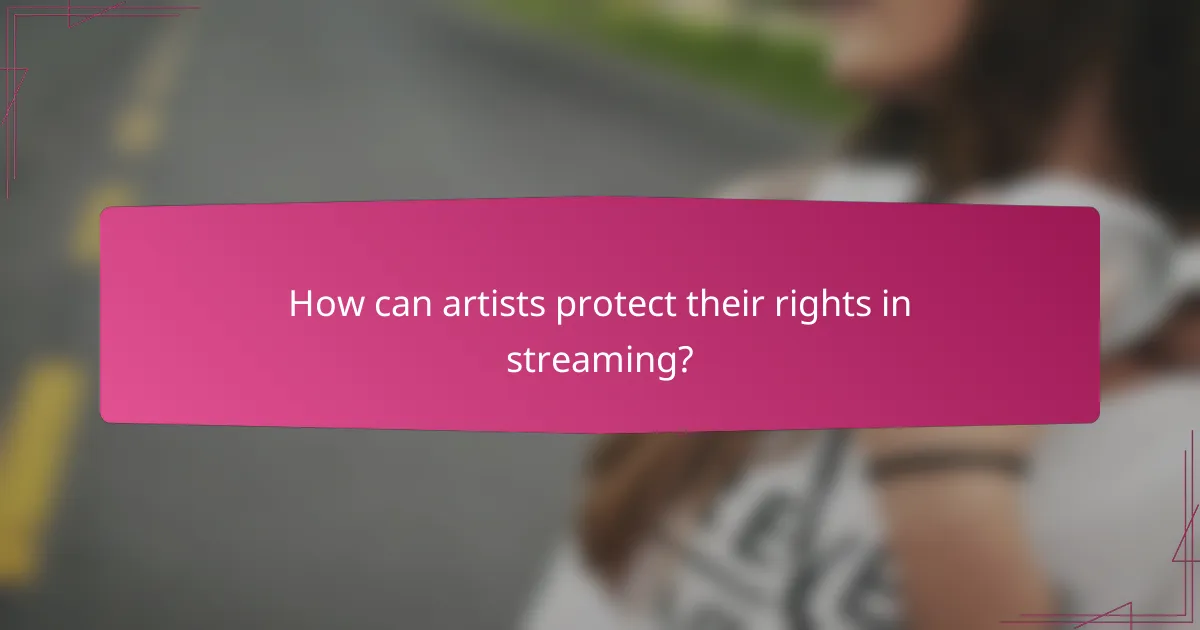
How can artists protect their rights in streaming?
Artists can protect their rights in streaming by understanding copyright registration and utilizing digital rights management (DRM) tools. These measures help ensure that their work is legally recognized and safeguarded against unauthorized use.
Copyright registration
Copyright registration is essential for artists to establish legal ownership of their music. In many countries, including the United States, registering a copyright provides legal advantages, such as the ability to sue for infringement and eligibility for statutory damages.
To register, artists typically need to submit an application along with a copy of their work to the relevant copyright office. Fees can vary, but they often range from $35 to $100, depending on the method of registration.
Digital rights management
Digital rights management (DRM) refers to technologies that control how digital music is used and distributed. For artists, implementing DRM can help prevent unauthorized copying and sharing of their music on streaming platforms.
Common DRM solutions include encryption and licensing systems that restrict access to the content. While DRM can protect artists’ rights, it may also limit user experience, so finding a balance is crucial. Artists should consider the trade-offs between protection and accessibility when choosing DRM solutions.
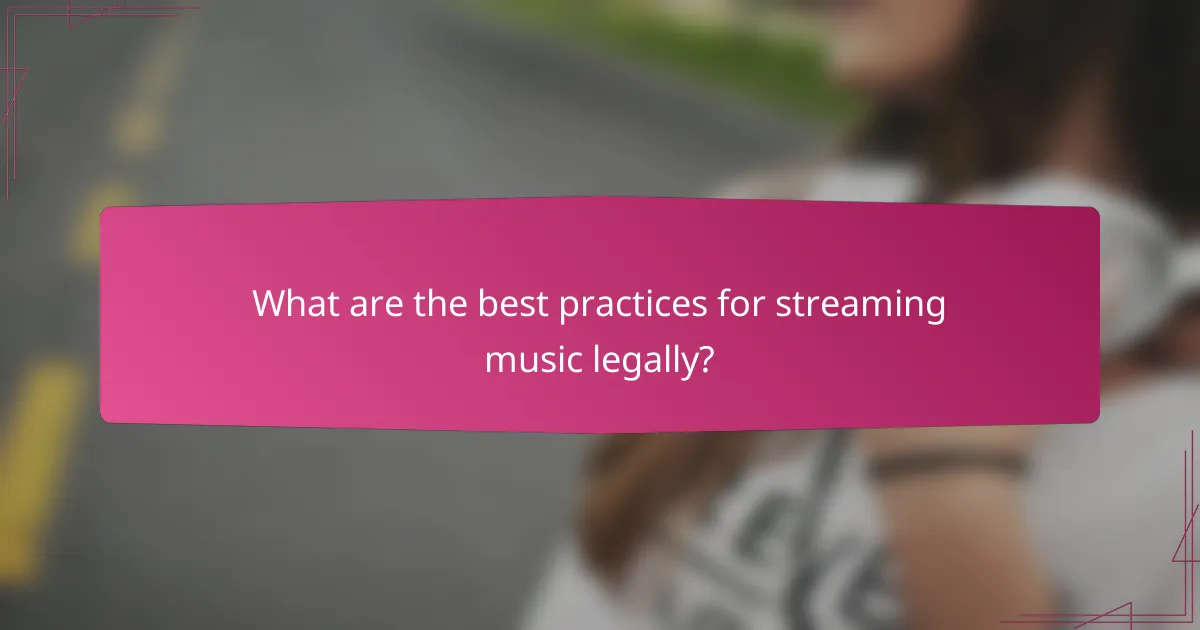
What are the best practices for streaming music legally?
To stream music legally, it is essential to use licensed content and comply with copyright laws. This involves understanding the sources of music you can use and establishing clear policies for user-generated content.
Using licensed music libraries
Utilizing licensed music libraries is a straightforward way to ensure legal compliance when streaming music. These libraries provide access to a wide range of tracks that you can use without infringing on copyright. Popular options include services like Epidemic Sound, Artlist, and AudioJungle, which offer various pricing models, including subscription and pay-per-track.
When selecting a music library, consider the types of licenses available. Some licenses allow for commercial use, while others may restrict usage to personal projects. Always read the terms carefully to avoid potential legal issues.
Implementing user-generated content policies
Establishing clear policies for user-generated content is crucial for platforms that allow users to upload music or videos. These policies should outline what types of content are acceptable and the consequences for violating copyright laws. Make sure to include guidelines on how users can report copyright infringement.
Consider using automated content recognition systems to monitor uploaded content. These systems can help identify copyrighted material and prevent unauthorized use. Additionally, educating users about copyright issues can foster a responsible community and reduce the risk of legal complications.
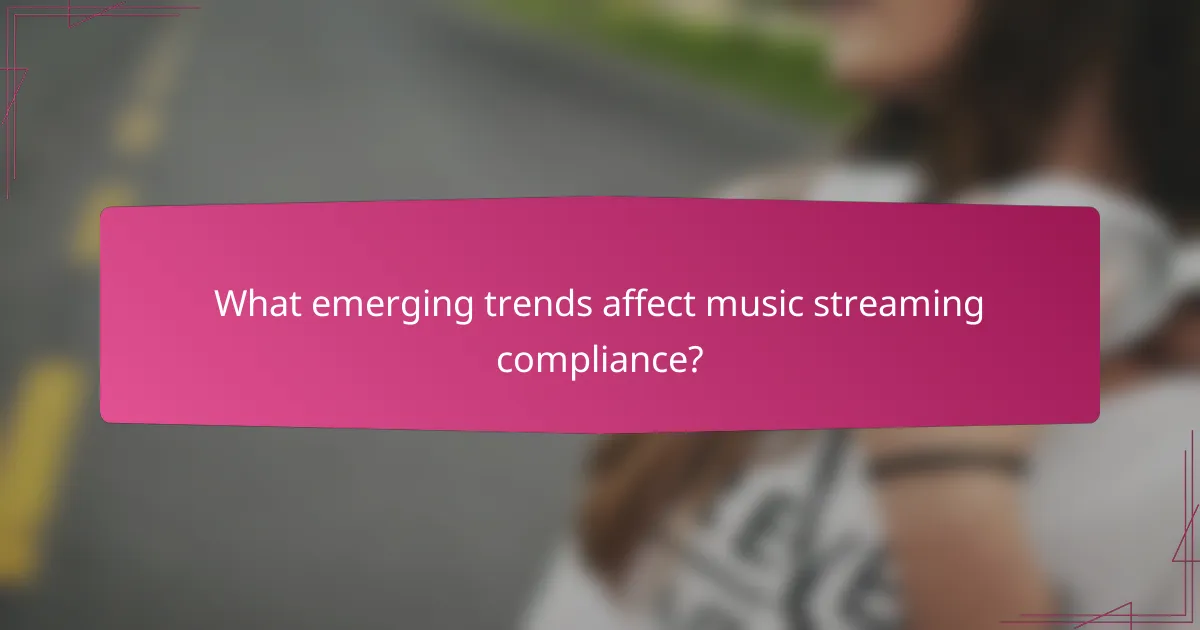
What emerging trends affect music streaming compliance?
Emerging trends in music streaming compliance are largely driven by evolving copyright legislation, technological advancements, and changing consumer behaviors. These factors can significantly impact how music is distributed and monetized, necessitating ongoing attention from streaming platforms and content creators.
Changes in copyright legislation
Recent changes in copyright legislation are reshaping the landscape for music streaming services. New laws may expand the rights of artists and copyright holders, which can affect licensing agreements and revenue sharing models.
For instance, the implementation of the Music Modernization Act in the United States has introduced new requirements for licensing mechanical rights, impacting how streaming platforms manage royalties. Compliance with these updated laws is crucial to avoid legal pitfalls and ensure fair compensation for creators.
Streaming services should regularly review their licensing agreements and stay informed about legislative changes to maintain compliance and adapt their business practices accordingly. Engaging legal experts can also help navigate these complexities effectively.
